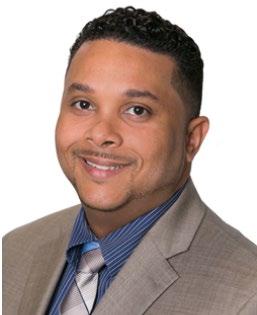
19 minute read
By Bruce Shutan
by SIPC
Shomari Scott
SPOTLIGHT INTERVIEW: SHOMARI SCOTT, CHIEF BUSINESS OFFICER, HEALTH CITY CAYMAN ISLANDS
Advertisement
TThis interview was conducted by SIIA’s partner in the Connect from Anywhere (CFA) live Medical Travel seminars, and was originally released as a special issue of their digital newsletter, prior to the Health City Cayman Islands live seminar. A recording of the seminar is available to SIIA members at www. siiacanoe.org.
MEDICAL TRAVEL & DIGITAL HEALTH NEWS (MTDHN): TELL US ABOUT YOUR INVOLVEMENT IN THE PROGRAM, ARE YOU CAYMAN NATIVE?
Shomari Scott (SS): Yes, I am a Caymanian and currently serve as Chief Business Officer for Health City Cayman Islands following several years as the Director of Marketing and Director of Business Development. Prior to this, I was the Director of Tourism for the Cayman Islands after being with the Department of Tourism for about a decade – I actually worked as an intern there while I was in college.
Tourism is one of the two pillars that make up the Cayman Islands economy, the other being financial services. I first heard the vision of Dr. Devi Shetty, founder and CEO of Health City, at a time when tourism was on a significant upward trend in the Cayman Islands.
Dr. Shetty, a surgeon, often says, "Life shouldn't be determined by a price," and he tells stories about his role.
"What do you think my job is?" he might say. The answer is, "Well, obviously to operate and save lives." But he would counter: "No, my job is this pen."
"This pen?" is the typical reaction, at which he writes with the pen and he says,
Dr. Shetty
"My job is to actually put a price on life. Now that's the most difficult thing, because when somebody comes in front of you and you actually have to tell them how much it costs for them to save their young child, because they need a highly technical cardiac surgery, that's the most difficult thing."
Dr. Shetty says that his duty in life is to ensure healthcare is so accessible and so affordable that we reduce the job of putting a price on life. His goal is to enable anybody to be able to afford, for instance, cardiac surgery.
He says, "One hundred years after the first cardiac transplant, 80% of the world -- if they need to actually have one of the tertiary types of cardiac procedures – would not have access or they can't afford it. That's wrong."
He might even look up at you, put up his iPhone and say, "Does this iPhone cost the same as it did five years ago? It costs less. So why is it that healthcare is the only industry in the world with the benefit of time and technology that has prices going up, instead of down?”
The point is that some people think they would die without an iPhone, but they won’t. But if people don't get access to healthcare, they will die.
"It's my vision to be able to change that," Dr Shetty declares.
MTDHN: IS HE REALIZING THIS VISION AT HEALTH CITY CAYMAN ISLANDS OR ELSEWHERE IN THE WORLD?
SS: Most definitely.
He was able to get a CABG (Coronary artery bypass grafting that improves blood flow to the heart) in India down from approximately US$10,000 to just US$1,400. He wants to do the same in regards to significant cost reduction here, on this side of the world.
He wants to prove that this price reduction wasn't just because they were operating in India. He is intent on showing that they're able to control price and that they're able to actually perform the highest quality of surgery in an environment akin to the top US health systems in accordance with US quality metrics.
The Cayman Islands was the perfect place for him to come and prove it, especially based on the fact that our cost of living is equivalent to New York City, and the cost of doing business is parallel. If we can actually have the price of a cardiac surgery in the Cayman Islands dwarf a price in New York -- apples to apples -- why can't you do it elsewhere so more people can gain access to quality healthcare?
Health City Cayman Islands really was a test case. Coming from my tourism background, I was never able to save a life. But thinking that I could be involved in an actual industry that had the potential to become the third pillar of the Cayman Islands economy as well as save lives, is an honor.

Health City Cayman Islands
I spoke about the first two pillars, Tourism and Financial Services, and now, Destination Healthcare as we call it, or Medical Tourism is becoming the third pillar of the Cayman Islands. This is such an exciting industry and vision and I am delight to be a part of this project.
You'll never get a chance like this in a lifetime. In the Cayman Islands, we're a success story, punching above our weight in many different areas -- tourism and financial services included.
It’s opportunities like this that create something people will speak about in the future -- for decades in time or maybe even hundreds of years from now – that don’t come along every day. These are serious lifesaving surgeries we are performing and I am proud to be a part of it.
MTDHN: IS YOUR EXPERIENCE IN COMMUNICATIONS, MARKETING AND ADVERTISING USEFUL IN THIS ROLE?
SS: Obviously, these skills were important for tourism and our team made the Cayman Islands successful.
Health City wanted me to bring this skillset to support Health City. Even as great as Dr. Devi Shetty is, and being a former physician for Mother Teresa, his brand awareness and that of NH the parent organization was minimal both in the Cayman Islands and in the US.
We were starting with a blank canvas. In healthcare you need to build trust and I was able to understand why somebody like myself was needed to lead the team and develop the marketing and brand awareness. We are building the image and the brand story so individuals will recognize and trust Health City and then be willing to access and use us.
MTDHN: HEALTH CITY IS KNOWN FOR ITS CARDIOLOGY SERVICES. TELL US ABOUT ITS OTHER CAPABILITIES THAT WOULD BE OF INTEREST TO, NOT ONLY CONSUMERS, BUT TO BUSINESSES WHO ARE EXPORTING THEIR PATIENTS TRAVELING TO THE CAYMAN ISLANDS.
SS: We have a full suite of the top tertiary types of services that you would want, from neurology and neurosurgery to cardiology and cardiothoracic care. We treat patients from all over the world.
In 2016, we treated patients from 60 different countries. We also have a sizable number of patients that travel from the US and Canada, and they


mostly access orthopedic and spine surgery, as well as bariatric surgery.
In Canada, they have socialized medicine – it’s not really free since the people obviously pay for healthcare with their taxes. For the most part, when you walk into a Canadian hospital, you don't pay out of pocket and there's no insurance mechanism. So why would Canadians come to Health City Cayman Islands for orthopedic surgery?
The answer is they have such long wait times. If you're feeling hip pain, it may take you six months to have an MRI. From the time you start from the inception of pain or until you actually have the surgery, it can be 24 months.
Conversely, they can purchase a plane ticket to the Cayman Islands, have their surgery, have two weeks of physiotherapy -- all inclusive, all bundled --and return home and be back to work within a month or two.
Here’s an actual patient example: we treated one individual who owns a boutique art gallery and is the most important employee from a strategic perspective and she also contributes with man power by hanging paintings on the wall. Not being able to use her shoulder was a big business disadvantage. So it made sense for her to spend US$16,000 to come to the Cayman Islands and have her shoulder taken care of. Two months later, she was back to work, 100% operational versus suffering for two years.
MTDHN: WHAT DOES THIS MEAN TO SELF-FUNDED US EMPLOYERS?
SS: In the US there are quite a few self-insured companies that actually use Health City. What we've found is the companies that do it the best have been doing it for a long time.
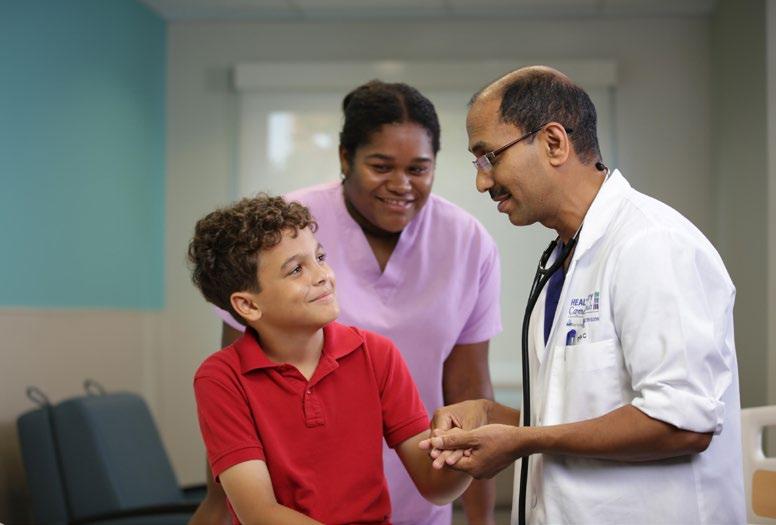
They have case managers on their team that are usually former nurse practitioners. They organize the travel and avail themselves of our services. For knees, shoulders or hips, the employee stays with us for two weeks and returns home. Our physicians are in constant contact with the patient, supported by a full international patient care team here at Health City that is assigned to specific companies or individuals.
This team puts the Health City doctor in contact with either the nurse practitioner or the doctor on the patient side -- in the US or elsewhere. We have all the medical records uploaded to a HIPAA compliant portal. Our physicians see and review the medical records and decide on whether or not surgery is needed. One of our patient care representatives actually sets up all of the travel.
The patients arrive and we have arranged with the government to meet them at the plane.
To rewind a little bit, Dr. Shetty said he needed 14 things from the Cayman Islands government prior to agreeing to actually making the investment in the Cayman Islands. One of those things was the ability to greet our patients at the plane and carry them directly through customs and immigration to our vehicle that would be waiting for them outside the airport.
So coming from tourism, many marquee hotel properties gave me grief in jest since we weren't able to offer this to their guests prior to Health City. Then all of a sudden, I am working at the hospital and we can meet patients at the foot of the plane. The great thing is that the government then made this concierge approach an actual service that others – such as hotels -- can pay for to receive that type of service.
But our patients receive this service free of cost to them, which eliminates a lot of anxiety for patients who are traveling to a destination they are unfamiliar with. We try and strip out all that anxiety, providing a friendly face that meets you at the foot of the plane and carries you through to the driver’s smiling face.
From point to point, you're taken care of. You arrive at the hospital and are admitted if you are going directly in for treatment. We also have single as well as two- or threebedroom condo units right here on campus, which are like mini apartments with a refrigerator, balcony and a pool to accommodate families of every size.
One of the unique things about Health City is that we have an offshoot of one of the Four Diamond Restaurants in town. The Blue Cilantro restaurant is one of the restaurants that has earned The Cayman Islands the distinction of being called the culinary capital of the Caribbean! We were able to convince its owner to be the third party provider for our kitchen here at Health City. The food patients receive is actually Four Diamond rated food.
Patients are amazed with this unique aspect. When we first started having testimonials, it was surprising that patients reported, “Great care, great doctors and nurses. Pam was a great Patient Care Representative. But the food, oh my goodness, you can't believe the food!"
We offer international cuisine, but even to the point where we get tourists staying over on Seven Mile Beach, our visitor hub, coming to Health City just to dine in our cafeteria. Our staff reacts, "Are you all here for surgery?" – to which they respond, "No, no, we're just here to get food. Yes! Our concierge told us that for the best curry on Island – and it sounds a little bit strange -- but there's a hospital with a cafeteria that has incredible food.”
MTDHN: THE PATIENT EXPERIENCE SOUNDS GREAT.
SS: It is. The overall experience at Health City is personalized and exceptional. Each patient has one representative assigned to take care of them and their family members while they’re in surgery.
This care continues throughout the process and the representative is in constant communication with case managers from the patient’s home country, including their physicians. When you're discharged, finished with your physical therapy and it's time
to leave, we organize all the details.
We return you right back to the airport, straight through immigration, customs and departure. Then we keep track of our patients, anywhere from three months to six months to a year, until they fully complete the healing process. This end-to-end process is very successful.
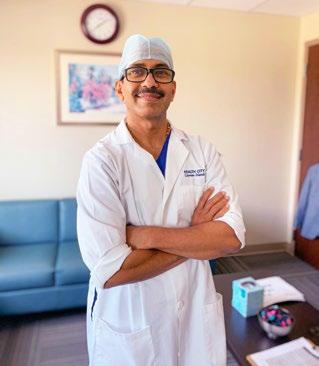
MTDHN: LET’S TALK ABOUT
Dr. Binoy QUALITY – THE
QUALITY OF CARE, THE DOCTORS AS WELL AS THE PATIENT OUTCOMES. IF THERE IS A LESS THAN OPTIMAL OUTCOME, IS THERE A WARRANTY OR GUARANTEE ON PRICING FOR A RE-DO?
SS: The great news about Health City is that we're a Joint Commission International accredited facility. We received our JCI accreditation within one year of opening our doors.
This is somewhat of a record because usually JCI would wait two years or so for the hospital to be ready. But we have the benefit of the Narayana Health group (NH), which has over 30 hospitals and embedded units across India, and many of the main facilities are JCI accredited.
So we already had a Quality Manager that came from the parent group that had previously been one of the strategic quality drivers getting facilities in India and even Dubai JCI-accredited. We knew that we were more than ready for JCI, and we've been accredited twice because accreditation occurs every two years. We're coming up to our third JCI accreditation in April and we've always passed JCI with flying colors.
The last time we had a JCI inspection, the inspector told us and everyone else at the conclusion meeting, "I want to let you know that this is not a good report." And everybody held their breath.
He continued, "This is an excellent report. In my 20 years of doing this, I have never seen a facility that had only a few partial non-compliance areas. I've never seen this. So the only way you guys have to go from here is perfection. I don't know how you're going to beat it."
That being said, we also track all of our quality measures. For instance, our unplanned return rate to the surgical theater within 48 hours is 0.88% and the benchmark for top-notch facilities is 4.6%.
Other examples:
Our anesthesia-related complication rate is 0% and the benchmark is 4.8%.
Readmission rate to ICU within 48 hours, we are at 0.4% and the benchmarks 2%.
For patient falls, which people are used to hearing about, the benchmark is anywhere between three to 5%. We're at 0.31%.
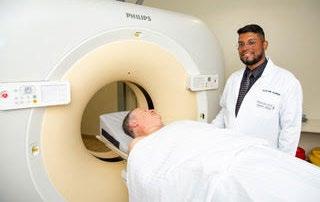
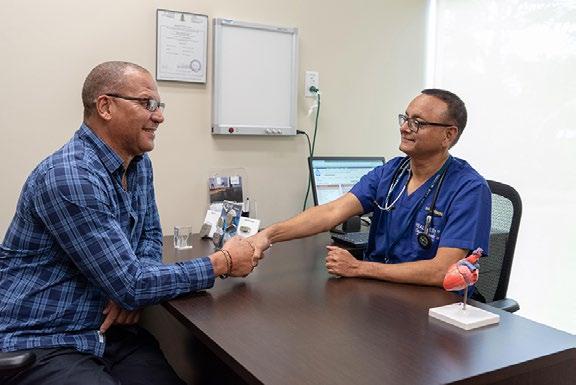
For readmission rate after a total joint procedure the benchmark is 5.61% and we’re at 1.89%.
We have a full list of the different quality indicators across every different specialty and anybody who asks, we're willing to share it with them. Back when the borders were more freely open, people would come here and we would participate in audits.
MTDHN: THIS IS IMPRESSIVE. IS THERE MORE?
Dr. Ravi "You know what? In the US if we mess up, we pray you don't sue us. Then we fix it, and then we charge you for both."
He pointed to our low infection rates and acknowledged that’s where the majority of the cost is in the US. With such low rates here, we are able to offer an affordable bundled price because we are actually very confident about surgical procedures and quality of outcomes.
MTDHN: TELL US ABOUT YOUR BUNDLED, ALL INCLUSIVE RATES. ARE THEY COMPETITIVE?
SS: Extremely competitive.
For instance, a knee, hip or shoulder replacement is approximately US$16,000. We don't have any differentiating pricing. We know that in the US, for example, a knee replacement -- which tends to be less than a hip or a shoulder -- can cost anywhere from $25,000 to 40,000 to 60,000 USD – or more!
With our bundled pricing, that's the entire cost. You're not going to pay anything else. If there's any complication due to the actual procedure, that's on us. We won't charge you anything more.
SS: The great thing is that when we first opened, we had half of the Board of Directors from Ascension Health in the US. One of the board members actually was also a board member of JCAHO in the US and he was blown away by our quality.
"I see the top of the tops in the US and your hospital is not only on par, you're exceeding some of the best facilities in regards to your quality," he said.
What it really boils down to, is looking at where healthcare cost becomes exorbitant -- and obviously there are many different areas. But when you look at complication rates or infection rates, that's where the cost increases.
When a health policy contributor to Forbes visited the facility, he wrote an article about his experience and the quality of outcomes.
So we're that confident in what we do and that how we price our surgeries.
That's the other thing that Dr. Shetty wants for healthcare: for it to become commoditized in the same way you go to a car dealership and you know exactly what that car costs. Why should you not know when you're coming for a cardiac surgery, exactly what that cardiac surgery is going to cost?
Here’s another example: a CABG bypass surgery will cost about US$25,000-$35,000 at Health City, depending upon the type of procedure. But a recent article in Time Magazine talking about prices in the US says, "What I learned from my $190,000 open heart surgery."
We know open hearts can cost you on the lower side anywhere from US$80,000, all the way up to US$250,000- $300,000. We're able to charge less than $35,000, all inclusive for a cardiac bypass surgery. That’s a big price differential, with quality outcomes that are as high, if not better than, the top facilities in the US for those specialties.
MTDHN: TELL US ABOUT YOUR EXPERIENCE WITH COVID. DO YOU NEED TO HAVE A VACCINE OR PROOF OF TESTING TO ENTER THE ISLAND?
SS: We are possibly the safest country in the world, because as the COVID pandemic started to unfold in March, we closed our borders to both cruise ships as well as to airlines. We were in a serious lockdown for about three months until we understood that there was no community transmission on Island. We had constant, rapid testing and we slowly opened up locally. Since then, we've slowly opened up to certain categories of travelers coming into the Cayman Islands. But anybody traveling in has to have a negative PCR, 48 hours prior to travel. They then have a PCR test at the airport in Cayman upon arrival.
To this date, anybody traveling into the Cayman islands has to quarantine for 14 days. We haven't had any masks for months. We're dining in restaurants and attending sporting events.
Obviously, tourism has been hurt. But due to the power of our Financial Services Industry, as well as development, we have stayed in a good position. The government is also taking care of our tourism workers that aren't working. While this puts a strain on medical tourism, the good thing for our hospital is that in the Cayman Islands, albeit a first world country, tertiary care was non-existent until we arrived. We have filled major healthcare gaps and in doing so have a good local population base of patients.
MTDHN: DO THE LOCAL RESIDENTS USE THE HOSPITAL?
SS: We've filled a lot of gaps in healthcare as previously mentioned.
The drop in medical tourism has been offset with the local population that might have otherwise been going overseas. They are no longer traveling away from Cayman for care due to the COVID situation to previous healthcare centers in the US for instance.
This has given us an opportunity to provide services to the 15 to 20% of local residents that may still have been going overseas. The good news is, even with our borders being more or less closed, we were able to treat all variety of illnesses and emergencies allowing the government to keep the virus contained and not being pressured to open due to medical necessity. The minimal medical tourism has been emergencies coming into the Cayman Islands. We were able to get special approvals -- and we've saved lives. With PPE, we go in and we do the surgery. Then the patient quarantines for the 14 days, and then with a negative PCR, they are released on the 15th day.
We have vaccinated over 80% of persons over 60 years of age living in Cayman. The government has stated that when we achieve 90% of the persons over 60, who are the most vulnerable to the severe impacts of COVID, they will look to reopening general tourism.
I think that by the Summer -- May, June, July -- we should be able to get more medical tourism back in the Cayman Islands.
Medical Stop Loss from Berkshire Hathaway Specialty Insurance comes with a professional claims team committed to doing the right thing for our customers – and doing it fast. Our customers know they will be reimbursed rapidly and accurately – with the certainty you would expect from our formidable balance sheet and trusted brand. That’s a policy you can rely on.
Reimbursement done right.
www.bhspecialty.com/msl
MTDHN: ONE LAST QUESTION ABOUT THE AVAILABILITY OF PRESCRIPTION MEDICAL TRAVEL. IS IT AVAILABLE?
SS: At times there is a negative connotation associated with being a Rx hub if just the selling of medication occurs. We never wanted to be associated with this. Health City has always wanted to deal with serious ailments and be known as a world class medical center, first and foremost.
Anybody traveling to Health City can get meds and pharmaceuticals. However, it has to be for a specific disease profile that we deal with. You can't just come and buy meds off the shelf. We do offer pharma, but we also treat the patient and work closely with the physicians overseas as well. You can't come here without seeing our physician and having a reason to get meds.
So we are not like some other destinations where you can fly in, and even in the airport, get pharmaceuticals. We want to be known in the world of medical tourism as one of the best facilities for surgical care and interventions for cardiac, orthopedics, neurosciences, oncology and other specialties etc.
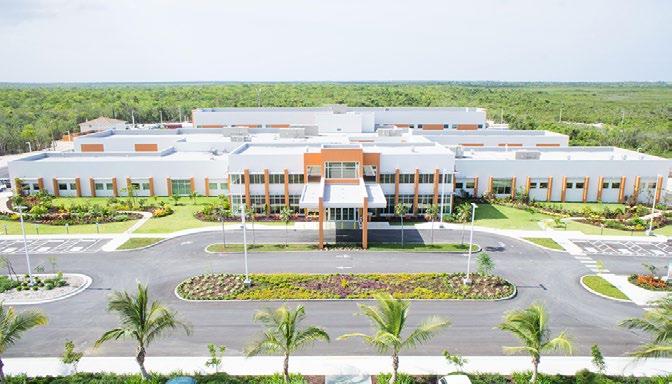
Health City Cayman Islands






